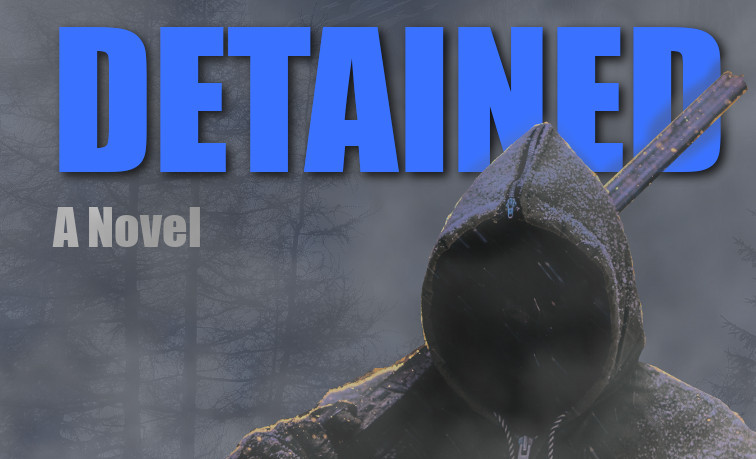Detained Chapter 20

I’ll be posting one chapter of my novel Detained every week throughout 2021. Download links below
20. Candace
“Dr. Raslowski,” Mike said slowly, rummaging in McCoy’s desk for the first aid kit. “Back up and explain this to us like we’re five years old. Let’s start there.”
Raslowski took a deep, shuddering breath and burst into coughs. “All right. Let’s start here: The universe is math.”
“Math,” Candace repeated. It made her think of math class at the high school, which had been her least favorite subject. Numbers always slipped away from her thoughts, and never behaved the way teachers or tutors or her brainy friends insisted they did. And then people got irritated and angry with her when she complained that it was all lies, all this math, that it was an ancient conspiracy going back centuries, going back to the Greeks and the Romans, pretending that numbers made sense.
“Math,” Raslowski said, wincing as Mike probed the bolt, a roll of clinging bandage in his hand. “Everything in the universe—you, me, the air, the planets, plasma, photons—is governed by mathematical relationships. You ever hear the theory that we’re all living in a Matrix?”
Candace blinked slowly. She felt like she’d somehow flashed back to all of the awful dates she’d ever been on, all the guys obsessed with geeky TV shows and video games. Maybe, she thought, she’d hit her head earlier in the day and everything since had been what one of those geeky old dates had called an Owl Creek Bridge Event, just her fevered brain spinning a fantasy while she lay in a ditch somewhere.
Raslowski turned to look at Mike. “The movie? Where the world’s a computer simulation?”
Mike nodded. “Sure. There is no spoon.”
Raslowski nodded, satisfied. “That’s my field. It’s a gross, gross simplification—ah, fuck, be careful!—but that’s where I live. Figuring out the equations that govern the universe. Think of it like this, you know what a variable is, right?”
Candace had a flash of memory and almost jumped in excitement. “Like X=15, so 2X=30,” she said.
Raslowski nodded. “That’s an equation. If you know the equation and the solution, you know what the variable is. You change the variable, you change the solution.”
Mike began wrapping his shoulder and the bolt up in bandages, and the doctor’s voice took on a rough, strained quality as he worked.
“In the universe, the equations I’m talking about—well, think of it this way: Us, all of us, we’re all the product of a billion, a trillion equations. How tall we are, the color of our eyes, our talents and our genetic infirmities, all products of math. And I was working on figuring out those equations and the variables. Imagine if I could “decode” you,” he said, jerking his chin at Candace. “I would be able to see every aspect of your existence. I’d see your past and your future, because it’s all math, it’s all governed by the variables and their values. Even better, I could adjust those variables. Change the value of X to 16 instead of 15, and suddenly you have blonde hair.”
Candace blinked. Raslowski grimaced and his face reddened.
“As I said: A gross simplification. I’m making this easy to understand.”
Mike looked up from his work on the wound, and winked. She found the wink remarkable. It reminded her of her father, who hadn’t met an occasion of any degree of solemnity that couldn’t be lightened with a well-timed fart joke. “He means he’s dumbing it down for us,” Mike said.
Raslowski closed his eyes and took a deep breath. “Just think of it like that: Once you know the equations, you can hack the universe. Hack anything, reality itself. Of course, the equations are incredibly complex. We won’t be folding time or pumping gold bricks out of a machine any time soon. We have only a limited understanding of the implications—we can change variables, but only in very limited scenarios, and we’re basically terrified to do it because we don’t have the computing power to truly map out the consequences.”
“No cure for cancer,” Candace said. Raslowski’s eyes popped open and he actually smiled at her, a perfectly natural-seeming grin that transformed him from Evil Genius to Friendly Grandpa.
“That’s right!” he said. “We aren’t there. Not even close. But—ouch, for fuck’s sake, man!—stay with me here, we are at a point where we can sometimes see the variables. Their value, if you follow.”
Mike paused, seeming to freeze. Candace felt the weight of the gun in her hand and put her Bedazzled Smile on her face. She thought Mr. Eastman would recognize it, as would Mr. Howard, her old Algebra teacher. The Bedazzled Smile was a soft, diffuse grin that conveyed a sort of trashy feminine stupidity that worked with men. Boys, too, but mainly men. It was a smile that said, oh, my little girl brain can’t handle all this mayun-ly talk! and then burst into bubblegum-flavored giggles.
The Bedazzled Smile had never been something she was proud of, but it was a tool that had gotten her out of a lot of assignments and pop quizzes. And now, as she used it on Raslowski, she regretted all those previous uses. They’d left her with a sorely lacking mathematical background, and she kind of wished she could have saved up the power of those previous moments and focused them all right here, in order o force Dr. Raslowski to just make some damn sense.
“I don’t,” she said. “Follow, that is.”
“He’s saying they can see the future,” Mike said. “Isn’t that right, Doc?”
“Give the man a prize,” Raslowski said. “We can’t read all the equations, or re-write them. We’re decades, maybe a century or two away from even being able to make the slightest changes to reality. But we stumbled on a cheat, a hack. A way to see what the values of variables in those equations will be. So, we can take a variable—say, the position of a water molecule—”
Candace’s smile collapsed. “A water molecule?”
“As I said, this is complex—think of all the molecules in the universe, each one with an equation solved for it, each one representing a variable in another equation. No, forget that. Just remember this: I have been able to create a computer modeling environment that can take the position of a water molecule in one moment and accurately predict it’s location and state in another moment. Past, future. We can model the position of that molecule from the moment an Oxygen atom and two friendly Hydrogen atoms bonded to the moment that bond ends. We can skip along that timeline like watching a video on your laptop.”
Laptop, she thought. Little did the good doctor know he’d stepped back into 1985 by entering this bar, this town.
“And once we have identified a variable, or a matrix of variables, we can even change their values and see how it affects the timeline. Except we don’t actually do that, because it would be nearly impossible to predict all possible permutations. A single tweak to a single variable could bring reality crashing down, changes reverberating backwards and forwards along a timeline, and rippling outward in a domino effect.”
Candace nodded. “Right. The Butterfly Effect.”
Both men turned to glance at her. Mike was smiling. Raslowski scowling.
“Yes,” he said flatly. “Something like that.”
Candace thought he somehow made the word something mean nothing.
Mike was tying off his bandage work. It looked pretty thorough to Candace, and she knew there would be another aw-shucks smile and a story about shadowing a doctor for three months if she asked about it. “So you can model people—you can track what someone’s going to do.”
Raslowski nodded through a wince. “We can. With enough data.”
Candace forgot to act dumb. “How could you possibly get enough data for something like that? People aren’t a single molecule. They’re—” She paused. “Well, trillions of molecules.”
Raslowski smiled. “More than that, actually, but the modeling was very clever. I was able to scale up to individuals through a compression algorithm. But we still needed data to work with. I had the math, I needed the variables.” He sighed. “You’ve heard about all the scandals surrounding government surveillance, yes?”
There was a moment of silence. “No,” Mike said, working on the sling. “No way. Look, even if the Feds and the Spooks bugged every computer, every phone, every traffic camera, everything, no way you’d get even a tiny fraction of the data you’d need to do what you’re talking about.”
Raslowski nods as Mike slides his arm into the sling. “True enough. Except, remember what I said about compression? There are patterns. All data has patterns. You figure those out, you can guess them, predict them, anticipate them. Like compressing an image file—you don’t need to represent every single black pixel, you just need to know that anything that isn’t another color is black.” He shrugged. Candace thought he looked pale, and figured shock was setting in. She guessed they had a few minutes before he went woozy.
“You’d need a boatload of heavy duty computers to crunch those numbers,” Mike said.
“And we have them, just up the road. We’ve been pouring data in and refining the models for two years. We’ve been running the numbers.”
Candace frowned. “Why here?”
Raslowski hesitated for a moment. “Frankly? Because there’s not much here here. Not many people. Not much happening. A lot less data to chew through. If we tried modeling even one street corner in New York City, we’d drown. But here, it’s manageable, relatively speaking.”
Mike stepped over to stand next to Candace. He crossed his arms across his chest. “Okay, so you’ve been working for two years to predict the future right here. And then you, what—ran the models? Got some output? And came running over here guns blazing? Why?”
Raslowski was sweating lightly. “The models worked. Green across the board. And when they spat out their results, we saw that you were going to destroy everything. You were going to cause the end of the goddamn world.”
Mike and Candace glanced at each other. Then Mike leaned forward slightly. “Who’s going to end the world?”
Raslowski sighed. “All of you.”

